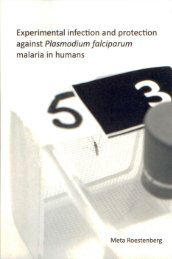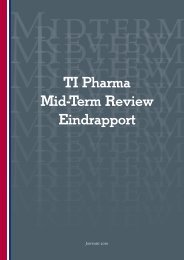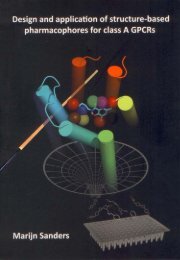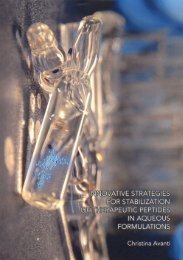- Page 2:
Diabetogenic Effects of Glucocortic
- Page 6:
VRIjE UNIVERSITEIT Diabetogenic Eff
- Page 10:
Leescommissie: prof.dr. M. Boers pr
- Page 14:
Chapter 12 Angiopoietine-like prote
- Page 22:
Chapter 1 General Introduction and
- Page 26:
Figure 1. Overview of the therapeut
- Page 30:
inding to the intracellular GR, fol
- Page 34:
further explored the effects of bot
- Page 38:
17. Kaplan SA, Shimizu CS. Effects
- Page 46:
Chapter 2 Novel Insights into Gluco
- Page 50:
1. INTRoDUCTIoN Glucocorticoid (GC)
- Page 54:
which GCs enhance gene transcriptio
- Page 58:
after GC-treatment has been propose
- Page 62:
oral), the vulnerability of the pop
- Page 66:
4.2. Glucocorticoids modulate adipo
- Page 70:
metabolism by reducing the expressi
- Page 74:
At older age, these mice developed
- Page 78:
mice with adipose tissue-specific 1
- Page 82:
REFERENCES 1. McMahon M, Gerich j,
- Page 86:
31. Henriksen jE, Alford F, Vaag A,
- Page 90:
60. Opherk C, Tronche F, Kellendonk
- Page 94:
89. Seckl jR, Morton NM, Chapman KE
- Page 98:
118. Matsumoto K, Yamasaki H, Akaza
- Page 106:
PART Glucocorticoids and islet-cell
- Page 112:
Chapter 3 Glucocorticoids induce be
- Page 116:
Chapter 3 Glucocorticoids induce be
- Page 120:
Chapter 3 Glucocorticoids induce be
- Page 124:
Chapter 3 Glucocorticoids induce be
- Page 128:
Chapter 3 Glucocorticoids induce be
- Page 132:
Chapter 3 Glucocorticoids induce be
- Page 136:
Chapter 3 Glucocorticoids induce be
- Page 140:
Chapter 3 Glucocorticoids induce be
- Page 144:
Chapter 3 Glucocorticoids induce be
- Page 152:
Chapter 4 Glucocorticoids impair be
- Page 156:
Chapter 4 Glucocorticoids impair be
- Page 160:
Chapter 4 Glucocorticoids impair be
- Page 164:
Chapter 4 Glucocorticoids impair be
- Page 168:
Chapter 4 Glucocorticoids impair be
- Page 172:
Chapter 4 Glucocorticoids impair be
- Page 176:
Chapter 4 Glucocorticoids impair be
- Page 184:
Chapter 5 Glucocorticoids, islet-ce
- Page 188:
Chapter 5 Glucocorticoids, islet-ce
- Page 192:
Chapter 5 Glucocorticoids, islet-ce
- Page 196:
Chapter 5 Glucocorticoids, islet-ce
- Page 200:
Chapter 5 Glucocorticoids, islet-ce
- Page 204:
Chapter 5 Glucocorticoids, islet-ce
- Page 208:
Chapter 5 Glucocorticoids, islet-ce
- Page 212:
Chapter 5 Glucocorticoids, islet-ce
- Page 216:
Chapter 5 Glucocorticoids, islet-ce
- Page 220:
Chapter 5 Glucocorticoids, islet-ce
- Page 224:
Chapter 5 Glucocorticoids, islet-ce
- Page 232:
Chapter 6 Glucocorticoid receptor S
- Page 236:
Chapter 6 Glucocorticoid receptor S
- Page 240:
Chapter 6 Glucocorticoid receptor S
- Page 244:
Chapter 6 Glucocorticoid receptor S
- Page 248:
Chapter 6 Glucocorticoid receptor S
- Page 252: Chapter 6 Glucocorticoid receptor S
- Page 256: Chapter 6 Glucocorticoid receptor S
- Page 260: Chapter 6 Glucocorticoid receptor S
- Page 266: Chapter 7 Glucagon-Like Peptide-1 R
- Page 270: Glucocorticoids (GCs) are diabetoge
- Page 274: glucagon, acetaminophen and exenati
- Page 278: C-peptide (AUC CP ) tended to be lo
- Page 282: Figure 2. The effect of prednisolon
- Page 286: oth drugs as well as their interact
- Page 290: REFERENCES 1. van Raalte DH, Ouwens
- Page 294: SUPPLEMENTAL FIGURES Supplemental F
- Page 302: Chapter 8 Low-dose Glucocorticoid T
- Page 308: Chapter 8 Glucocorticoids affect in
- Page 312: Chapter 8 Glucocorticoids affect in
- Page 316: Chapter 8 Glucocorticoids affect in
- Page 320: Chapter 8 Glucocorticoids affect in
- Page 324: Chapter 8 Glucocorticoids affect in
- Page 328: Chapter 8 Glucocorticoids affect in
- Page 332: Chapter 8 Glucocorticoids affect in
- Page 336: Chapter 8 Glucocorticoids affect in
- Page 340: Chapter 8 Glucocorticoids affect in
- Page 344: Chapter 8 Glucocorticoids affect in
- Page 350: Chapter 9 Glycosphingolipid Metabol
- Page 354:
INTRoDUCTIoN Glucocorticoids (GCs)
- Page 358:
Experimental protocol: The design o
- Page 362:
oxidative phosphorylation (OXPHOS)
- Page 366:
Table 3. Mitochondrial respiration
- Page 370:
prednisolone 30 mg group, and the c
- Page 374:
REFERENCES 1. Schacke H, Docke WD,
- Page 378:
29. Kabayama K, Sato T, Saito K, Lo
- Page 386:
Chapter 10 Glucocorticoid Treatment
- Page 390:
Glucocorticoids (GCs) represent the
- Page 394:
capillary recruitment. Capillary re
- Page 398:
elatively small numbers in each gro
- Page 402:
Table 2. Metabolic parameters and b
- Page 406:
Table 3. Capillary density before a
- Page 410:
Prednisolone and insulin signaling
- Page 414:
DISCUSSIoN This is the first study
- Page 418:
glucose uptake suggesting that the
- Page 422:
15. de jongh RT, Serne EH, RG Ij, d
- Page 426:
SUPPLEMENTARy MATERIAL Supplemental
- Page 434:
Chapter 11 Glucocorticoids alter Su
- Page 438:
Glucocorticoids (GCs) are important
- Page 442:
Adipose tissue was washed with ster
- Page 446:
Figure 1. Effects of glucocorticoid
- Page 450:
Impaired insulin action in adipose
- Page 454:
REFERENCES 1. van Raalte DH, Ouwens
- Page 458:
30. Ouchi N, Parker JL, Lugus JJ, W
- Page 464:
Chapter 12 Angptl4 in glucocorticoi
- Page 468:
Chapter 12 Angptl4 in glucocorticoi
- Page 472:
Chapter 12 Angptl4 in glucocorticoi
- Page 476:
Chapter 12 Angptl4 in glucocorticoi
- Page 480:
Chapter 12 Angptl4 in glucocorticoi
- Page 484:
Chapter 12 Angptl4 in glucocorticoi
- Page 488:
Chapter 12 Angptl4 in glucocorticoi
- Page 494:
PART Metabolic Effects of Glucocort
- Page 500:
Chapter 13 Glucocorticoids in acute
- Page 504:
Chapter 13 Glucocorticoids in acute
- Page 508:
Chapter 13 Glucocorticoids in acute
- Page 512:
Chapter 13 Glucocorticoids in acute
- Page 516:
Chapter 13 Glucocorticoids in acute
- Page 520:
Chapter 13 Glucocorticoids in acute
- Page 524:
Chapter 13 Glucocorticoids in acute
- Page 528:
Chapter 13 Glucocorticoids in acute
- Page 534:
Chapter 14 Glucose Tolerance, Insul
- Page 538:
INTRoDUCTIoN Rheumatoid arthritis (
- Page 542:
independent ethics committee approv
- Page 546:
Glucose tolerance state: The preval
- Page 550:
Data represent means ± standard de
- Page 554:
**** Number of DMARDs (both synthet
- Page 558:
Effect modification: As compared to
- Page 562:
described here, may even be underes
- Page 566:
15. Wolfe F, Michaud K. Corticoster
- Page 574:
PART Discussion V
- Page 580:
Chapter 15 General Discussion Gluco
- Page 584:
Chapter 15 General Discussion Studi
- Page 588:
Chapter 15 General Discussion Figur
- Page 592:
Chapter 15 General Discussion AMP-a
- Page 596:
Chapter 15 General Discussion shown
- Page 600:
Chapter 15 General Discussion decre
- Page 604:
Chapter 15 General Discussion Inter
- Page 608:
Chapter 15 General Discussion Mecha
- Page 612:
Chapter 15 General Discussion and a
- Page 616:
Chapter 15 General Discussion and p
- Page 620:
Chapter 15 General Discussion short
- Page 624:
Chapter 15 General Discussion Table
- Page 628:
Chapter 15 General Discussion REFER
- Page 632:
Chapter 15 General Discussion 30. S
- Page 636:
Chapter 15 General Discussion 58. L
- Page 640:
Chapter 15 General Discussion 88. F
- Page 644:
Chapter 15 General Discussion 119.
- Page 648:
Chapter 15 General Discussion 146.
- Page 652:
Chapter 15 General Discussion 175.
- Page 658:
Nederlandse Samenvatting Diabetogen
- Page 662:
het bleek ook heel effectief bij de
- Page 666:
door prednisolon behandeling. In di
- Page 670:
In deel 4 van mijn proefschrift bes
- Page 678:
Dankwoord Acknowledgements
- Page 682:
Geachte Dr. Ouwens, beste Margriet.
- Page 686:
Dr. Kersten, beste Sander, veel dan
- Page 694:
Biography
- Page 698:
Daniël Henri van Raalte was born o
- Page 704:
List of Publications 1. van Genugte
- Page 708:
List of Publications 20. van Raalte
- Page 716:
List of co-author affiliations Andr
- Page 720:
List of co-author affiliations Jos
- Page 724:
List of co-author affiliations Timo
- Page 732:
Color Figures Chapter 1 Figure 1. O













